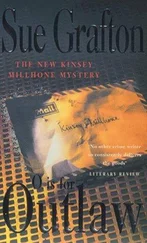The Weidmanns lived on Lower Road, one of Horton Ravine's less prestigious addresses. Despite the pricey tone of the neighborhood, half the homes were nondescript. Theirs was unremarkable, a one-story pale green stucco, adorned with wrought-iron porch supports and topped with a flat rock-composite roof. The lot was large and nicely landscaped, but the house was too close to the road to count for much. Given the fact that Peter Weidmann was an architect, I'd expected a lavish layout, an entertainment pavilion or an indoor pool, embellishments that would reflect the full range of his design talents. Or maybe this one did that.
I parked on a concrete apron to one side of the house. Once on the porch, I rang the bell, and waited. I half expected a maid, but Mrs. Weidmann came to the front door herself. She must have been in her seventies, smartly turned out in a two-piece black velour sweatsuit and a pair of Rockport walking shoes.
"Mrs. Weidmann? I'm Kinsey Millhone," I said, holding out my hand politely.
She seemed disconcerted by the move and there was one of those embarrassing delays until we actually shook hands. There was something in the hesitation-distaste or prudery-that caused me to bristle inwardly. Her hair was a stiff cap of platinum blond, parted down the middle, the strands separating into two tense curls, like rams' horns in the center. She had bags under her eyes and her upper lids had begun to droop, reducing the visible portion of her irises to mere hints of blue. Her skin was a peachy color, her cheeks tinted a hot pink. She looked like she'd just flunked a stress test, but a closer examination showed she was simply wearing foundation and blusher in a shade far too vivid for her coloring.
She stared at me, as if waiting for a little door-to-door salesmanship. "What was this regarding? I'm afraid it's slipped my mind."
"I work for Lonnie Kingman, Kenneth Voigt's attorney in his suit against David Barney-"
"Oh! Yes, yes, yes. Of course. You wanted to speak to Peter about the murder. Terrible. I believe you said the other fellow died. What was his name, that investigator…?" She tapped her fingers on her forehead as if to stimulate thought.
"Morley Shine," I said.
"That's the one." She lowered her voice. "I thought he was dreadful. I didn't like him."
"Really," I said, feeling instantly defensive. I'd always thought Morley was a good investigator and a nice man besides.
She wrinkled her nose and the corners of her mouth turned up. "He smelled so peculiar. I'm sure the man drank." Her expression was one of perpetual pained smiles superimposed on profound disapproval. Age plays cruel tricks on the human face; all our repressed feelings become visible on the surface, where they harden like a mask. "He was here several times, asking all these silly questions. I hope you don't intend to do that."
"I will have to ask some, but I hope not to be a bother. May I come in?"
"Of course. Please excuse my bad manners. Peter's in the garden. We can chat out there. I was going out for my walk when you knocked, but I can do that in a bit. Do you exercise?"
"I jog."
"Jogging's very bad. All that pounding is much too hard on the knees," she said. "Walking's the thing. My doctor is Julian Clifford… do you know him?"
I shook my head.
"He's a top orthopedic surgeon. He's also a neighbor and a very dear friend. I can't tell you how often he's warned me about the harm people do in their determination to jog. It's absurd."
"Really," I said faintly.
She went on in this vein, her tone argumentative though I offered no resistance. I had no intention of altering my regimen for a woman who thought Morley smelled bad. Her shoes made no sound as we crossed the marble-tiled foyer and moved down a hallway to the rear of the house. While the exterior was strictly fifties ranch style, the interior was furnished in an Oriental motif: Persian carpets, matching silk-paneled screens, ornate mirrors, a black lacquer chest inlaid with mother-of-pearl. She had two matching cloisonné vases the size of umbrella stands. Many items seemed to come in pairs, one placed on either side of something grotesque.
I followed her through the kitchen and out the back door, where a concrete patio ran across the rear of the house. Four low steps led down to a brick walk that extended into a small formal garden. Toward the rear of the property, I could see a woody area peppered with toadstools, some growing singly, some in fairy rings. The air smelled damply of dead leaves and mosses. A few forlorn birds were still perched in the treetops, their singing disconsolate as winter crept closer.
The patio furniture was wrought iron and canvas, the seat cushions fading from exposure to the weather. Peter Weidmann was napping, a thick hardback book lying open in his lap. I'd glanced at a copy in a bookstore recently: Part One of some celebrity's boring autobiography 'as told to' some writer who'd been hired to render it intelligent. It looked as if he'd read all the way to page five. A sprinkling of cigarette butts surrounded his chair. He was probably not allowed to smoke in the house.
He looked like a man who'd lived all his life in a business suit. Now retired, he wore dark, stiff jeans and a new plaid flannel shirt, packing creases still showing, two buttons open to expose a portion of his white undershirt. Why does a man like that look so vulnerable in leisure clothes? He was narrow through the face, with black unruly eyebrows and short-cropped white hair. He and Yolanda had reached that stage in their fifty-year marriage where she looked more like his mother than his wife.
"This is called active retirement," she said with a laugh. "I wish I could retire, but of course, I never had a job." Her tone of voice was jocular, though her comment was bitter. The pretended humor barely served to mask the bite underneath. She nudged his shoulder, relishing the excuse to disturb his peace and quiet. "Someone to see you, Peter."
"I can come back a little later. There's no need to wake him."
"He won't mind a bit. It's not as if he's done any hard work today." She leaned close and said, "Peter."
He roused himself with a start, disoriented by the depths of his sleep and the sudden voice in his ear.
"We have company. It's about Isabelle and David. This young woman is Mr. Kingman's secretary." She turned to me with a sudden worry. "I hope that's right. You're not an attorney yourself, are you?"
"I'm a private investigator."
"I didn't think you looked like an attorney. Your name again is what-?"
Mr. Weidmann set his book aside and rose to his feet. He extended his hand. "Peter Weidmann."
We shook hands. "I'm Kinsey Millhone. Sorry to disturb you."
"That's quite all right. Would you like some coffee or a cup of tea?"
"Thanks, but I'm fine."
Yolanda said to him, "Well, it's much too chilly to be out on the porch." And then to me, "He's had the flu twice this winter and I'm not about to go through that again. I was exhausted from all the fetching and carrying. Men are such babies when it comes to being sick." The complaint was accompanied by a wink to me. She'd claim she was teasing if Peter took offense.
"I'm afraid I don't make a very good patient," he said.
"It's not something you'd want to be good at," I replied.
He made a gesture toward the house. "We can talk in the den."
We formed a little three-person procession into the house, which seemed nearly stuffy after the damp air outside. The den was small and the furniture had the same shabby feel as the porch chairs. I suspected the house was divided into 'his' and 'hers.'
'Her' portion was well appointed-expensive, overdecorated, filled with objects probably collected from various trips to foreign ports. She'd co-opted the living room, the formal dining room, the kitchen, the breakfast room, and most probably all the bathrooms, the guest bedroom, and the master suite. He'd been accorded the back porch and the den, where he'd carefully hoarded all the household items she was threatening to throw out.
Читать дальше











